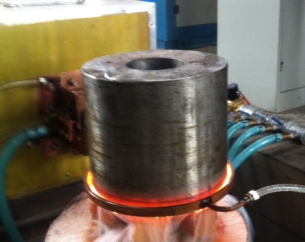- 09
- Nov
Introduction to Induction Heating Process Requirements
รู้เบื้องต้นเกี่ยวกับ Induction Heating Process Requirements
1. Heat penetration of the workpiece, such as: fasteners, standard parts, auto parts, hardware tools, rigging, hot upsetting and hot rolling of twist drills, etc. The larger the diameter of the workpiece, the lower the frequency should be. Such as: below Φ4mm, suitable for high frequency and ultra-high frequency (100-500KHz); Φ4-16, mm suitable for high frequency (50-100KHz) Φ16-40mm suitable for super audio (10-50KHz); 10KHz)
2. Heat treatment, shafts, gears, quenching and annealing of stainless steel products, etc. Taking quenching as an example, the shallower the quenching layer of the workpiece, the higher the frequency, and the deeper the quenching layer, the lower the frequency. For example: The quenching layer is 02.-0.8mm suitable for 100-250KHz, ultra-high frequency, high frequency; 1.0-1.5mm is suitable for 40-50KHz high frequency, super audio frequency; 1.5-2.0mm is suitable for 20-25KHz super audio frequency; 2.0-3.0 mm is suitable for 8-20KHz super audio and intermediate frequency; 3.0-5.0mm is suitable for 4-8KHz intermediate frequency; 5.0-8.0mm is suitable for 2.5-4KHz intermediate frequency.
3. Brazing, drill bits, turning tools, reamers, milling cutters, drill bits, etc. and composite welding of different materials at the bottom of the stainless steel pot, the larger the welding volume, the lower the frequency. Taking turning tool welding as an example, for example: tools below 20mm are suitable for 50-100KHz high frequency; tools above 20–30mm are suitable for 10-50KHz high frequency and super audio; tools above 30mm are suitable for 1-8KHz intermediate frequency.
4, smelting gold, silver, copper, lead and other precious metals. It depends on the furnace and production efficiency. Small capacity can choose high frequency, most of them choose super audio frequency and medium frequency; super audio frequency can meet the general application of die casting industry, and can melt 200KG aluminum ingots per hour.

